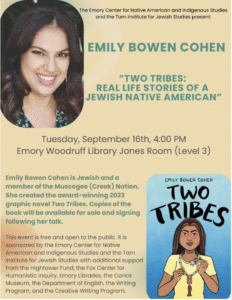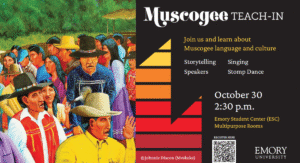Emily Bowen Cohen, author of the graphic novel, Two Tribes shares stories that inspired the book. From a childhood in Oklahoma to an adolescence in New Jersey, Emily experienced challenges to both her identities. Thanks to a family reunion with her Muscogee family, Emily learned where she belonged: a member of two tribes with similarities and differences that make her wholly who she is.
 This event is hosted and sponsored by Emory’s Center for Native American and Indigenous Studies and the Tam Institute for Jewish Studies with additional support from the Hightower Fund, Emory Libraries, the Fox Center for Humanistic Inquiry, the Department of English, the Writing Program, the Creative Writing Program, and the Michael C. Carlos Museum.
This event is hosted and sponsored by Emory’s Center for Native American and Indigenous Studies and the Tam Institute for Jewish Studies with additional support from the Hightower Fund, Emory Libraries, the Fox Center for Humanistic Inquiry, the Department of English, the Writing Program, the Creative Writing Program, and the Michael C. Carlos Museum.
Speaker Bio: Emily Bowen Cohen is an award-winning author and engaging public speaker known for powerful storytelling that explores complex identities. She is Jewish and a member of the Muscogee (Creek) Nation, and she creates comics that explore cultural intersectionality. Her debut graphic novel Two Tribes was published by HarperCollins’s Native-focused imprint, Heartdrum, in 2023. Registration is free and public.
Learn more about Emily at https://authorsunbound.com/emily-bowen-cohen/
Learn more about the event here: Two Tribes
Time: 4:00 – 5:00pm
Place: The Jones Room (Level 3) of the Robert W. Woodruff Library








